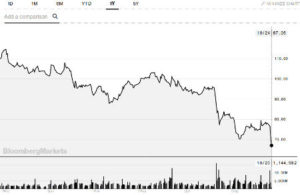
Bayer seems to be wrapping up their purchase of Monsanto, but investors are not impressed.
$289 Million Verdict
The first in a series of lawsuits over Monsanto’s glyphosate based weedkiller Round Up has resulted in an award of $289 million for the plaintiff. Like Bayer is quick to point out this is only one jury and one verdict, which is subject to review and appeal. There are many reasons to believe this amount could be reduced or eliminated altogether. It’s clearly enough to make investors nervous, but might not be a serious issue for Bayer in the long run. We’ll have to wait and see how this develops.
Divestment of Assets to BASF
Bayer themselves identify the unexpectedly large sale of $9 billion in assets to BASF as one of the reasons for falling earnings. In part this probably comes out of their ‘fake news’ Glyphosate ECI here in Europe.
In the lead up to Monsanto-Bayer merger, a suspiciously funded European Citizens’ Initiative was launched to remove glyphosate as an unpatented product from the EU market. Through the ways I describe in the link above, I was able to see it was completely staged.
The issue was Bayer had a competing patented product called glufosinate, marketed under the name Liberty or Basta. Bayer was trying to remove glyphosate because it was cheap and generic formulations were available.
I wrote some letters to Dutch and EU politicians, alerting them to these things. After I wrote these letters, the EU launched an investigation into the then pending merger between Monsanto and Bayer. As a result of this investigation, it emerged Bayer had an entire agricultural chemicals unit dedicated to making chemical analogues of glyphosate, and glufosinate was one of these. Bayer was clearly planning to combine Round Up Ready technologies of Monsanto with their own chemical variations of Round Up, and create even more herbicides and herbicide resistant crops.
The EU then required Bayer to sell it’s entire agricultural chemical unit to BASF, as a condition of the merger between Monsanto and Bayer. The US justice department later required even more assets be sold to BASF.
The announcement that glyphosate was to be removed from the EU market was also pretty sudden, and farmers did not have enough time to plan for this. This would have created an unusually high demand for Bayer’s alternative patented herbicide products. It was agreed to extend the licensing of glyphosate for a few more years, in order to reduce the impact on farmers and allow competing organic products to be developed.
This is really how politics is supposed to work. It’s an example of politicians being responsive to citizens, and doing what they can within the rule of law to make things better. It’s the kind of thing that happens behind the scenes, that we don’t always hear about. We should all be very happy with the way this turned out.
Bayer’s Shareholders
What reason do the Bayer shareholders give for loss of confidence in the company? Some are pointing to a lack of direction in the company. Bayer has been unable to give a clear statement on the way forward, and what their new products will be. It seems at least in the short term their business model has been disrupted.
Other Comments
EU Parliamentary elections are around the corner. Everything that transpired above was with ‘normal’ politicians. If I had to deal with politicians from populist parties, it would have probably all been a lot harder. I think mainstream politicians in Europe have learned a hard lesson from the last parliamentary elections, Brexit and the populist parties that are coming into power around Europe. I think they are trying harder now.
I want to work constructively with whomever comes to power, and never choose one party over another. I hope however that when readers of this blog vote, they choose candidates with a constructive agenda.

